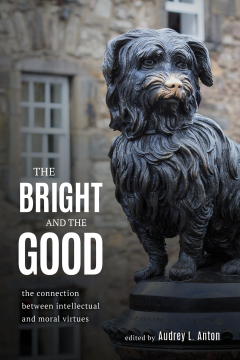
Additional Information
Book Details
Abstract
The Bright and the Good examines the connection between intellectual and moral virtues both through the history of philosophy and as it can be illustrated in comprehensive examinations of specific virtues.
The first part of the book investigates the original assumptions posited by Ancient Western philosophers concerning the apparent connection between moral and intellectual virtues. The second part follows the assumptions through history from the Medieval and Modern periods of philosophy, noting how the assumption has been tweaked to accommodate specific ideological and scientific precepts. The third part showcases inquiries into specific virtues, taking the reader on an investigation unfettered by any specific time period or ideology so as to consider the apparent connection between the moral and the intellectual on a case-by-case basis. These essays relate both historical context and contemporary concerns and examine topics including vice, ignorance, hope, courage, patience, justice and mercy.
The Bright and the Good is a noteworthy and worthwhile collection. It offers considerable insight into the relationships that hold between intellectual and moral virtues, both in terms of their nature and their formation. This collection is valuable to both scholars interested in the history of virtue ethics and those working in contemporary virtue theory.
Kevin Timpe, William H. Jellema Chair in Christian Philosophy, Calvin College
Audrey Anton has put together an excellent anthology, and a valuable resource for scholars working on the topic of virtue.
Julia Driver, Professor of Philosophy, Washington University in St. Louis
Audrey L. Anton is Assistant Professor of Philosophy at Western Kentucky University.
Table of Contents
| Section Title | Page | Action | Price |
|---|---|---|---|
| Contents | vii | ||
| Acknowledgments | ix | ||
| Introduction | xi | ||
| Part I. ANCIENT ORIGINS OF THE INTELLECTUAL-MORAL RELATIONSHIP | 1 | ||
| Chapter One. Geometry in the Humming of the Strings | 3 | ||
| Chapter Two. What the Theoretical Sciences Can Teach Us About Right Action: Plato and Intellectual Virtues | 19 | ||
| Chapter Three. How Practical Wisdom Depends on Moral Excellence | 33 | ||
| Chapter Four. Practical Wisdom and Happiness as a Political Achievement in Aristotle | 49 | ||
| Chapter Five. Intellectual Virtue and the Non-Sage in Stoicism | 77 | ||
| Part II. THE ASSUMPTION RE-EXAMINED | 91 | ||
| Chapter Six. Pagan and Christian Paths to Wisdom | 93 | ||
| Chapter Seven. Moral and Intellectual Virtue rom Greek to Arabic Philosophy | 111 | ||
| Chapter Eight. Moral and Intellectual Virtues in the Medieval Latin Tradition—and the Limits of Virtue Ethics | 137 | ||
| Chapter Nine. Hume, Intellectual Virtue, and Virtue Epistemology | 153 | ||
| Chapter Ten. Mill on Rousseau on the Sciences and Morality | 169 | ||
| Chapter Eleven. Kant and the Intellectual Virtues: “Good and Stupid”? | 183 | ||
| Part III. SPECIFIC VIRTUES AND CONTEMPORARY REFLECTIONS | 199 | ||
| Chapter Twelve. How Second Nature Becomes Primary | 201 | ||
| Chapter Thirteen. Intellectual Trust in an Examined Life: On Vicious and Virtuous Trust in Philosophy | 223 | ||
| Chapter Fourteen. Ignorance and Hope | 243 | ||
| Chapter Fifteen. Intellectual Courage | 263 | ||
| Chapter Sixteen. Patience and Practical Wisdom | 277 | ||
| Chapter Seventeen. The Virtues of Justice and Mercy: On Knowing the Difference | 293 | ||
| Index | 323 | ||
| About the Contributors | 331 |
